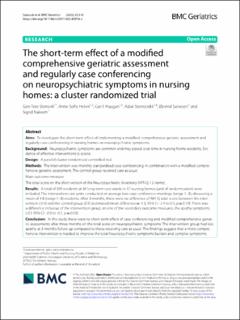| dc.contributor.author | Stensvik, Geir-Tore | |
| dc.contributor.author | Helvik, Anne-Sofie | |
| dc.contributor.author | Haugan, Gørill | |
| dc.contributor.author | Steinsbekk, Aslak | |
| dc.contributor.author | Salvesen, Øyvind | |
| dc.contributor.author | Nakrem, Sigrid | |
| dc.date.accessioned | 2022-11-08T10:41:48Z | |
| dc.date.available | 2022-11-08T10:41:48Z | |
| dc.date.created | 2022-05-16T13:27:58Z | |
| dc.date.issued | 2022 | |
| dc.identifier.issn | 1471-2318 | |
| dc.identifier.uri | https://hdl.handle.net/11250/3030610 | |
| dc.description.abstract | Aims
To investigate the short-term effect of implementing a modified comprehensive geriatric assessment and regularly case conferencing in nursing homes on neuropsychiatric symptoms.
Background
Neuropsychiatric symptoms are common and may persist over time in nursing home residents. Evidence of effective interventions is scarce.
Design
A parallel cluster-randomised controlled trial.
Methods
The intervention was monthly standardised case conferencing in combination with a modified comprehensive geriatric assessment. The control group received care as usual.
Main outcome measure.
The total score on the short version of the Neuropsychiatric Inventory (NPI-Q, 12-items).
Results
A total of 309 residents at 34 long-term care wards in 17 nursing homes (unit of randomisation) were included. The intervention care units conducted on average two case conference-meetings (range 1–3), discussing a mean of 4.8 (range 1–8) residents. After 3 months, there were no difference of NPI-Q total score between the intervention (-0.4) and the control group (0.5) (estimated mean difference = -1.0, 95% CI -2.4 to 0.5, p = 0.19). There was a difference in favour of the intervention group on one of the secondary outcome measures, the apathy symptoms (-0.5 95% CI: -0.9 to -0.1, p = 0.03).
Conclusion
In this study there were no short-term effect of case conferencing and modified comprehensive geriatric assessments after three months on the total score on neuropsychiatric symptoms. The intervention group had less apathy at 3 months follow-up compared to those receiving care as usual. The findings suggest that a more comprehensive intervention is needed to improve the total Neuropsychiatric symptoms burden and complex symptoms. | en_US |
| dc.language.iso | eng | en_US |
| dc.publisher | BMC | en_US |
| dc.rights | Navngivelse 4.0 Internasjonal | * |
| dc.rights.uri | http://creativecommons.org/licenses/by/4.0/deed.no | * |
| dc.title | The short-term effect of a modified comprehensive geriatric assessment and regularly case conferencing on neuropsychiatric symptoms in nursing homes: a cluster randomized trial | en_US |
| dc.title.alternative | The short-term effect of a modified comprehensive geriatric assessment and regularly case conferencing on neuropsychiatric symptoms in nursing homes: a cluster randomized trial | en_US |
| dc.type | Peer reviewed | en_US |
| dc.type | Journal article | en_US |
| dc.description.version | publishedVersion | en_US |
| dc.source.volume | 22 | en_US |
| dc.source.journal | BMC Geriatrics | en_US |
| dc.source.issue | 1 | en_US |
| dc.identifier.doi | https://doi.org/10.1186/s12877-022-02976-x | |
| dc.identifier.cristin | 2024897 | |
| cristin.ispublished | true | |
| cristin.fulltext | original | |
| cristin.qualitycode | 1 | |

